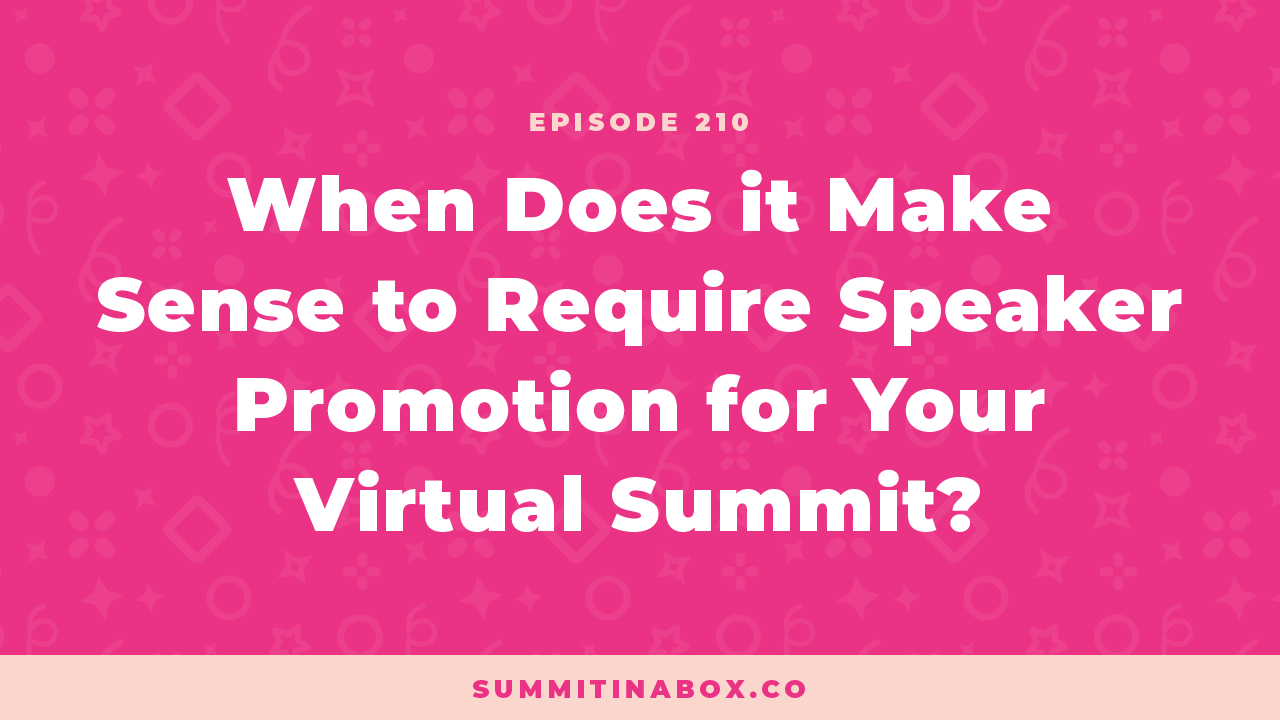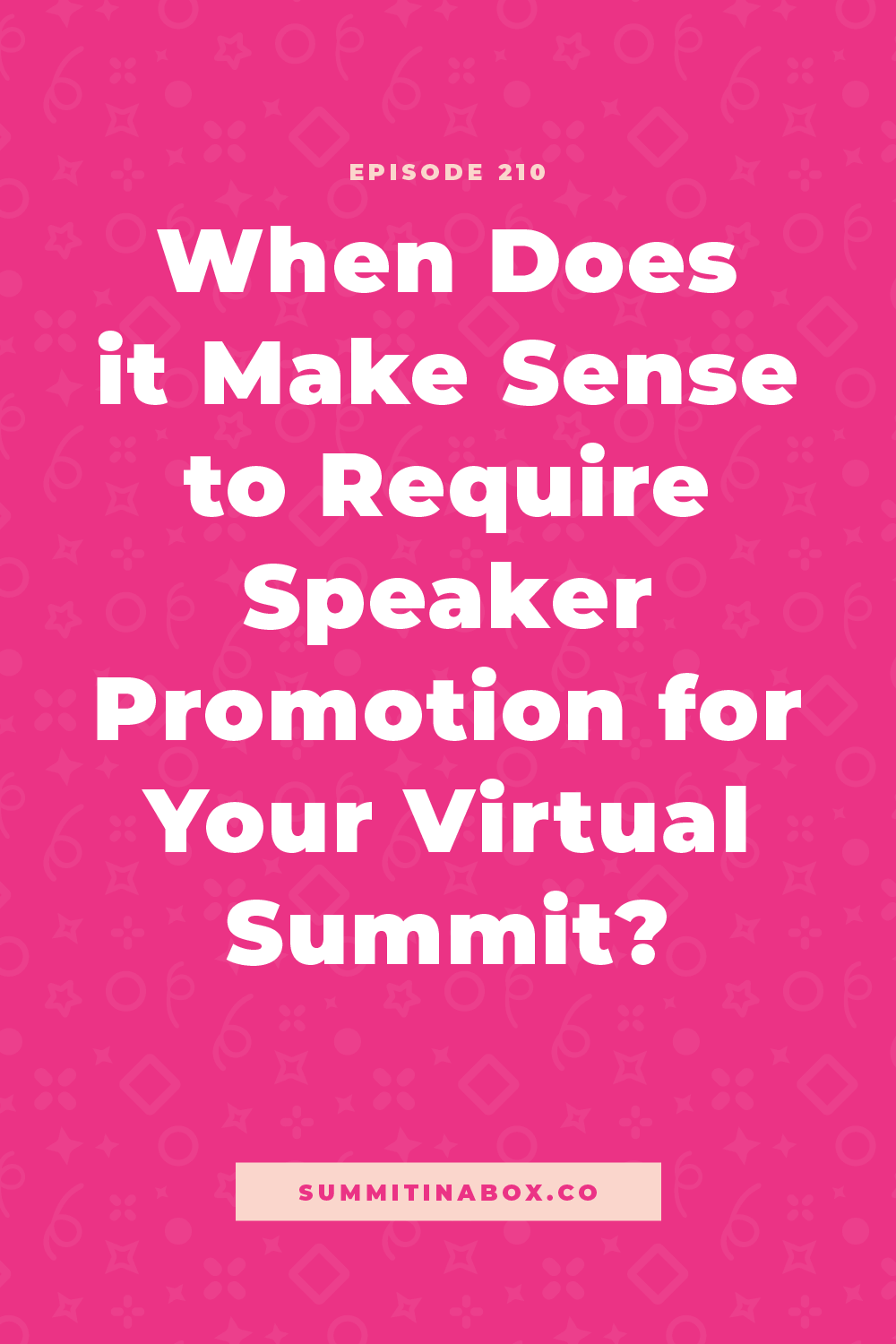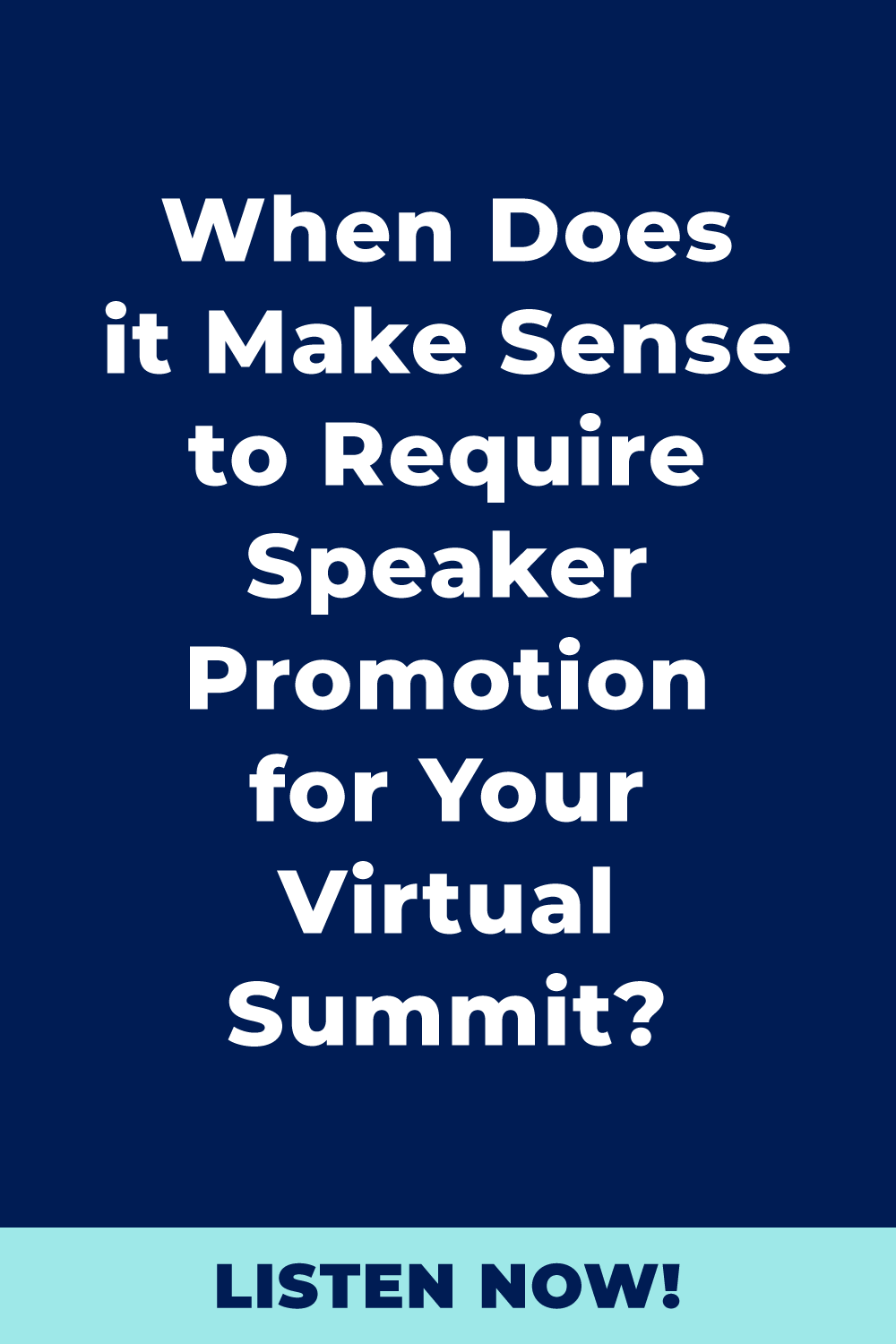When Does it Make Sense to Require Speaker Promotion for Your Virtual Summit?


One of the big benefits of summits that makes them so powerful compared to other launch methods is that you have 20+ speakers who are helping you get the word out about your event. But in order to experience those benefits, you need your speakers to promote!
Because speaker promotion plays a big role in the success of your summit, many hosts assume they need to have strict requirements and stay on top of their speakers to make sure they’re pulling their weight. Others look to the requirements they’ve seen other summit hosts place on their speakers and blindly assume that’s what they should do too.
But is that always the best approach?
Requiring speaker promotion isn’t actually that black and white, and in some cases, your event is more likely to be a success when you don’t have any requirements at all!
This week, we’re getting into the different situations where it does and doesn’t make sense to require speaker promotion, and how to find the right balance for your next event!
Listen to the episode
Download the episode transcript here.
Where people go wrong with promotion requirements
Let’s start by covering the three most common mistakes I see people making when it comes to speaker promotion requirements:
1. Blindly Adding Requirements - Many summit hosts go into pitching their speakers without putting much thought into why they’re requiring the things they do. They look at the requirements they’ve seen when they were pitched to speak at events and do the same thinking without thinking anything else of it. But this doesn’t lead to great results!
2. Adding requirements out of scarcity and self-doubt - Some summit hosts approach their requirements thinking that they have to require promotion in order to see results from their summit, but that’s just not the case. If you put together a solid Summit, you position it well so that your audience is truly going to benefit from it, and you pitch the right speakers, you don't have to require anything to see results.
3. Requiring more than you can promise - If you are a newer business owner who's never had a successful launch or never hosted a summit before, it's a big ask to require that your speakers promote. If you don’t have a track record that shows you know what you’re doing and will create a good experience for your summit attendees, it’s a risk for your speakers to promote it. They are putting you in front of their audience and also taking attention away from other things they could promote instead. Many speakers will promote an event they’re speaking at, but it’s a big ask to require them to promote.
I've seen people require 3+ emails with a 5,000 person email list and a 30% open rate. Please Don't Ever Do That, Okay? Learn Why In Episode 137: Can I Require A Certain Email List Size From Virtual Summit Speakers?
What I’ve done in the past
I’ve experimented with lots of different approaches to speaker promotion requirements in the past. To be totally honest, I don’t remember exactly what I required in my first few summits, but over the years I know I’ve had many different requirements including:
No requirements - For my March 2022 virtual summit for designers, I had zero speaker promotion for the first time. There were two reasons for this:
- Since I hadn’t been very active in that business in the last year, I wanted to increase the likelihood of people I hadn’t built relationships with saying yes.
- I wanted to experiment with how not having speaker requirements impacted results so I could pass that info on to our clients and students.
Result: I wanted to see what would happen if we didn't require anything and just hosted a really awesome event, and loved on our people instead. Overall, it went fine. Fewer people promoted for sure, but we still saw good results, and the people who promoted were the ones that wanted to, which is always going to bring the best results.
Soft requirements - This is the most common approach I’ve taken, which is to require one email and social media posts. For the majority of my summits, I mention these requirements in the pitch email and speaker information page and then reach out to speakers who haven't promoted by the week before the summit, without making a big deal about the requirements. I didn’t include the requirements in the contract or draw a ton of attention to them.
Result: For the type of people I’ve had speaking at the majority of my summits, this approach worked well. There were a few bigger-name speakers that conveniently ignored the promotion requirement, which I expected, but overall most people promoted and saw good results. This is probably the option I’ll default to in the future.
Harder requirements - For my most recent summit in December 2022, we had the same one email and one social media post promotion requirement, but we put a much bigger focus on those expectations.
In my pitch email, I specifically called out the promotion requirements and said that I’d rather they turn me down than say yes if they weren’t going to be able to promote. I included promotion requirements in the speaker agreement, and I had them check a box when they submit their speaker information acknowledging that they understood the promotion requirements.
This was a lot more upfront than I’d ever been with my pitches before, but there were reasons behind it that made me feel like I could justify it.
I know that I have something valuable to offer our speakers when they participate in our summits. Being associated with us is generally good for someone's business, our audience trusts our recommendations, I hire and refer a ton of people I know, and we have a relatively large audience.
We've also hosted tons of events that have seen great results, and this one was a proven summit that we’d hosted before. That made me confident that our speakers would see great results from being a part of the summit, which made the requirements feel good to me.
Result: I honestly expected to hear more “no”s with our harder speaker requirements, but it worked out just fine! We did have one person turn us down because she was doing her own promotion and wouldn't have been able to promote which is exactly what I wanted. Everyone else was totally cool with it, and everyone except one speaker who skipped the email stuck to the requirements.
I don't think any of my options are necessarily better than the other. They each made sense and felt good to me based on where I was in my business at the time. Now let’s cover when it does and doesn’t make sense to require promotion:
When it doesn’t makes sense to require promotion
There are two scenarios where I really think it doesn’t make sense to require promotions.
1. You’re a newer business owner hosting a first-time summit.
If you don't have a lot to offer your speakers in terms of proof that you'll deliver results, it's probably not a great idea to have strict speaker promotion requirements. If you're in that place, your number one goal should just be to land speakers who have the same audience as your Summit.
Whether or not they all promote, being associated with other people in the industry, and those relationships are a great thing for your business. Even if only half promote, you'll still see great growth that you can build on in your next event.
Look to the future rather than just immediate results, because summits bring so much ongoing benefit, especially when you focus on building speakers relationships.
Keep in mind, if you don't have requirements, you don't necessarily have to flaunt the fact that they don't have to promote, and you should still provide swipe copy and graphics make it as easy as possible for your speakers who want to promote to do so. But you don’t want to promote the fact that they don’t have to promote!
2. You’re pitching someone with no audience or a different audience
I always recommend having a good number of speakers at your event who have the same audience as you in order to see the best results. But sometimes there’s a topic that you want covered that you know would serve your summit attendees well, but the person speaking has an audience with no overlap. Other times, you might want to bring in an expert speaker who isn’t necessarily a business owner with an email list to promote to. In these cases, I don’t think it makes sense to require promotion.
With our most recent Summit, our speakers for our Let’s Do Better sessions who spoke on inclusive events and inclusive payment plans, didn't necessarily have the exact audience that our summit was targeted to. I didn't place a requirement on them, because it wouldn’t benefit anyone, for them to be promoting something to an audience that the thing wasn't created for, right? So I did remove the promo requirement from those people, and that's something else you can consider.
When it does make sense to require promotion
So, when does it make sense to require promotion? In pretty much every other scenario, I’d include at least a soft requirement to send one email and one social media post, especially if:
1. You have proven results in your business
You don’t necessarily need to have hosted a summit before, but you need to have some business results that show your speakers that it’s safe for them to put you in front of their hard-earned audience. We tend to talk to more experienced business owners here, so for many of you, this probably isn't as much of a concern, But if you're newer in business, it's something to consider.
2. When you’re pitching people with the right audience
And of course, when you’re pitching someone with the same audience as your summit (which is who you should be pitching most of the time!), it makes sense to require some sort of promotion, as long as you’re confident you have something to offer them in return.
One final thing you might want to consider before you set your speaker promo requirements: the better your relationship is with a person, the more likely they are to promote whether or not there are any types of requirements. If they like you, understand your values, and value what you do in your business, they're gonna promote for you! And along with that, the more well-targeted your event is, the more people will want to promote as well, which is why relationships and targeting are some of our biggest focuses in the Launch with a Summit Accelerator.
Don't let seeing any type of industry-standard promo requirements make you default to thinking it's the right move for you. Reflect on why you're adding each requirement you’re considering, and if your speakers can expect a return that makes that requirement worth it.
Remember, your speakers need to benefit too. It's not all just about you as the host. We are all about feel-good summits that benefit everybody involved around here, and I want to see that reflected in your event as well!
Resources
- Episode 137: Can I Require A Certain Email List Size From Virtual Summit Speakers?
- Episode 207: Why I Sold My 6-Figure Summit After 6 Profitable Events
- Episode 206: The Secret To Landing "Big Name" Speakers For Your Virtual Summit
- Episode 68l How To Get Speakers To Share Your Virtual Summit
- Bonus Episode 90.5: How Not To Treat Your Virtual Summit Speakers Featuring Desola Davis
- Episode 208: Top Takeaways From Our December 2022 Virtual Summit
- Episode 135: How To Make It Easy For Speakers To Promote Your Virtual Summit
- Summit Host Hangout Facebook group
- Launch with a Summit Accelerator
- 6-Figure Summits Workshop Bundle
Pin it for later!




